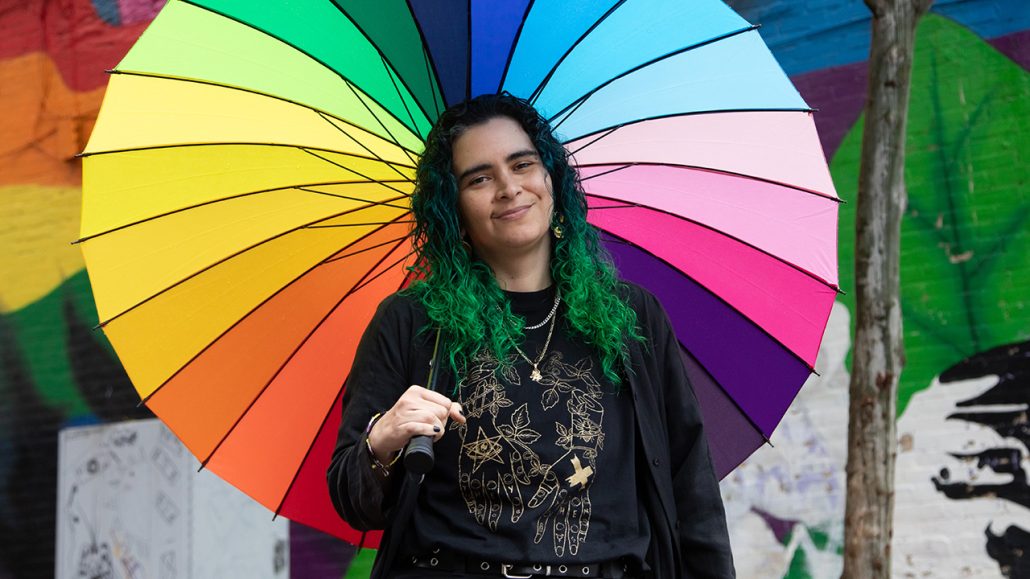

Photo by Daria Perevezentsev
Ensuring mental health supports are offered along with other resources to address poverty, unemployment and homelessness in the 2SLGBTQ+ community
When Eli Carmona arrived in Toronto, they weren’t sure where to turn. Carmona, a native of El Salvador who identifies as non-binary, had left their home country for Canada in 2014. As a member of the 2SLGBTQ+ community, they didn’t think that staying in El Salvador was an option.
“El Salvador doesn’t have gender-affirming laws,” Carmona said. “I knew I had to get out of the country in order to be myself.”
Discrimination and violence in the country are realities that are well-documented in the media. According to the Inter-American Commission on Human Rights, the life expectancy of a trans woman in El Salvador is just 33 years, which is less than half that of the overall population, at 74 years. The supports that would be required for both safety and a personal sense of self-worth just did not exist in the country. If people can leave, they do. Carmona was one of them.
Fortunately, Carmona had family in Toronto. Their aunt and uncle provided them emotional and practical support upon arrival. And, although Carmona was not officially out to them as non-binary, “They knew.”
“The first thing they told me to do was to go to The 519,” Carmona said.
The 519 has long provided support for the 2SLGBTQ+ community through programs that foster emotional and mental health wellness while also working to promote inclusion, understanding and respect. Well regarded throughout Toronto and beyond, The 519 has been able to continue to provide much-needed services because of its funding and support from United Way of Greater Toronto (UWGT), which also selected it as an “anchor agency.”
Anchor agencies under the UWGT umbrella are provided dependable and flexible funding for five years, allowing frontline agencies the resources for both programming and core operating support. Having this foundational resource facilitates designated anchor agencies the ability to meet immediate needs that the agencies require, as well as providing support for building long-term capacity. For those, like Carmona, in the 2SLGBTQ+ community, such support can be a lifesaver — literally.
Steph Massey oversees the Trans Youth Mentorship Program at The 519. In their role, they have seen many within the community who need such support. With the COVID pandemic underscoring already precarious life conditions for 2SLGBTQ+ people, the need for resources couldn’t be more evident. Poverty, unemployment and homelessness are just many of the real lived experiences of those who go to The 519 for support.
“Many jobs don’t offer a wage that is matched to the cost of living and are often entry level jobs which have a level of precarity, and don’t offer benefits,” said Massey.
In addition, they said outside discrimination from employers adds to an already stressful existence, making mental health support a priority. Finding work in a place where sexual and gender orientation are respected and supported is a challenge that is common for members of the 2SLGBTQ+ community.
Dr. Kwame McKenzie agrees. The CEO of The Wellesley Institute has seen the need for mental health support in specific communities firsthand. The Institute works in research and policy to improve health and health equity specifically in the GTA through action on the social determinants of health.
In the nine years that McKenzie has been at the helm, the need has increased considerably. Working in partnership with the organization, The Wellesley Institute was able to efficiently and effectively survey low income and racialized populations who were considerably impacted during COVID. Information led to action, expedited by this support.
McKenzie references the current health budget allocation for Ontario, which is almost $60 billion. “If you can just move a small proportion of that you can really make a difference in people’s lives,” he said.
The UWGT’s connections and networks are key to helping to change people’s lives, the doctor said. “The United Way, who have such a great network, are really great key partners to agencies like us who are interested in policy and change,” McKenzie said.
According to its annual report, during the 2021-22 fiscal year, the UWGT made just over $70 million in community investments through its network of agencies and community services.
“The United Way is an essential part of the city. We need them when we’re doing our work,” said McKenzie. “The United Way is the glue and if you get rid of that glue things fall apart.”
Back at The 519, Carmona has become a familiar face at the centre, not only as a participant in various programs but as an employee, too. After volunteering at the organization shortly after arriving in Toronto, Carmona is now a full-time communications specialist. Their perspective echoes one of the underlying tenets of the UWGT philosophy. “Together we win, separated we fail,” they said.